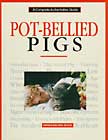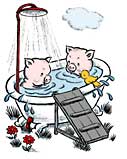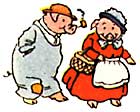|
|
 |
|
|
|
|
Pot-Bellied Pigs: Sharp, Sassy and Special
|
 

Don't miss this excellent book:
Pot-Bellied Pigs: A Quarterly
by Dennis Kelsey-Wood

A concise, attractively formatted book perfect for the beginner, but also intriguing for others. It has an appealing mix of photos and is easy to read. Basic, helpful comments and suggestions, and best of all is the behavior/training section, and lots of discipline tips.
Great savings!

Shop PETCO.com and Save!
|
Pigs are also unrelenting in their quest for food and can learn by watching their owners how to open the fridge, cupboards, pantry or any other place where food may be lurking. (If you have a relative staying with you that you don’t like, place them in the path of a hungry pig!) They can be very demanding, begging for food and even trying to take food from weaker family members (kids). They also have a need to "root" that must be met. (It’s like cats who must always knead whether they have their claws or not). Pigs dig and explore with their snouts and in so doing may knock books off shelves, explore purses, rip up papers and clothing to make a bed, pull up carpeting or linoleum, peel wallpaper, eat houseplants and flower bulbs. Pigs will eat anything they find and, just as you would place medications and other dangerous items out of a child’s reach, you must do the same if you live with a pot-bellied pig.
 The average life span of a pot-bellied pig is 12-18 years, although many live up to the age of twenty. These creatures do well indoors or out; their ideal living temperature being 70 degrees. Even if the pig lives indoors, it will still need a space to play and walk outdoors, as well. A fenced in area is recommended, although many county and city parks have made revisions that now include spaces for exotic animals. They can be fed commercially prepared foods, but are known to really like fresh fruits and vegetables. Fresh water should also be available at all times. Although referred to as "miniature," the term is very relative, as even though they are smaller than most pigs, they still usually weigh about 125 pounds when full grown (about three years of age). The average life span of a pot-bellied pig is 12-18 years, although many live up to the age of twenty. These creatures do well indoors or out; their ideal living temperature being 70 degrees. Even if the pig lives indoors, it will still need a space to play and walk outdoors, as well. A fenced in area is recommended, although many county and city parks have made revisions that now include spaces for exotic animals. They can be fed commercially prepared foods, but are known to really like fresh fruits and vegetables. Fresh water should also be available at all times. Although referred to as "miniature," the term is very relative, as even though they are smaller than most pigs, they still usually weigh about 125 pounds when full grown (about three years of age).
Pot-bellied pigs have the tendency to be very territorial and will protect their space through aggression. Much as a dog holds onto a bone, a pig may be willing to fight for his or her space. Pigs do respond well to positive reinforcement (i.e., using praise and treats when demonstrating desirable behavior) and do not do well at all with physical punishment. They understand "NO" very well, but should never be hit. If they are, whatever you wanted the pig to do, it most assuredly will not! They have very long memories (not unlike the Sicilian side of other families).
Pot-bellied pigs and children do not always get along together. This is due to a herd instinct and the need to establish dominance over those they perceive as weaker. They will even do this to adults, but usually figure out pretty quickly that this is a losing proposition. Children represent something they can dominate, although this is not to say that some pigs will not get along with some children. They can and will, but they do have a pecking order that any owner and parent must be made aware of. If you have one pig and one child, the pig may attempt to become the "dominant pig" of the house, (even if it turns out to be the cleanest and neatest of all family members).
Pot-bellies and dogs are not a good combination as well. Pigs are prey to dogs. If you get a pet pig and have a dog, NEVER leave them alone together and NEVER feed them close to one another. There are exceptions here as there are to every rule, but the price is too high to take a chance. Pigs seem to get along best with cats. Goats fare pretty well also, but then again, it all depends on the goat and the pig. Horses and pigs often work well, but the combination still depends on the personalities of the individual animals.
 If you decide to get a pot-bellied pig, please consider adopting one from one of the many centers and sanctuaries run by pet lovers located around the country, To find an animal rescue center in your area, check the adoption link page at the web site Pigs4Ever.com. All this research has left me with a renewed respect for porcines everywhere. If you decide to get a pot-bellied pig, please consider adopting one from one of the many centers and sanctuaries run by pet lovers located around the country, To find an animal rescue center in your area, check the adoption link page at the web site Pigs4Ever.com. All this research has left me with a renewed respect for porcines everywhere.
I salute Miss Piggy and Miss Piggy Sue! (Or is it Ms?)
<< back to page 1
|
|
|